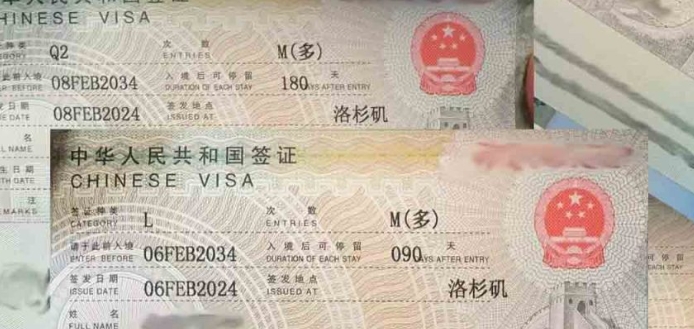Breaking News! Transit Visa-Free Stay Now Extended to 240 Hours
The National Immigration Administration announced today (December 17) that effective immediately, the transit visa-free stay policy for foreign nationals has been fully optimized and extended. The previous limits of 72 hours and 144 hours for transit visa-free stays have been extended to 240 hours (10 days). Additionally, 21 new ports of entry have been added for transit visa-free entry, and the permitted stay regions have been further expanded.
Eligible citizens from 54 countries, including Russia, Brazil, the United Kingdom, the United States, and Canada, who transit through China en route to a third country (or region) can enter China visa-free through any of the 60 designated open ports in 24 provinces (regions, municipalities) and stay in specified regions for no more than 240 hours.
Newly Added Ports for the Transit Visa-Free Policy
The 21 newly added ports include:
- Taiyuan Wusu International Airport, Shanxi
- Sunan Shuofang International Airport and Yangzhou Taizhou International Airport, Jiangsu
- Wenzhou Longwan and Yiwu International Airports, Zhejiang
- Hefei Xinqiao and Huangshan Tunxi International Airports, Anhui
- Fuzhou Changle, Quanzhou Jinjiang, and Wuyishan International Airports, Fujian
- Nanchang International Airport, Jiangxi
- Jinan Yaoqiang, Yantai Penglai, and Weihai Dashuibo International Airports, Shandong
- Zhangjiajie Hehua International Airport, Hunan
- Nanning Wuxu and Beihai Fucheng International Airports, Guangxi
- Haikou Meilan and Sanya Phoenix International Airports, Hainan
- Chengdu Tianfu International Airport, Sichuan
- Guiyang Longdongbao International Airport, Guizhou
This increases the number of eligible open ports from 39 to 60.
Expansion of Permitted Stay Regions
The policy’s scope has been expanded to include five additional provinces—Shanxi, Anhui, Jiangxi, Hainan, and Guizhou—bringing the total to 24 provinces (regions, municipalities).
- In Anhui, Hainan, and Guizhou, transit visa-free travelers can stay throughout the entire province.
- In Shanxi, the permitted stay regions are limited to Taiyuan and Datong.
- In Jiangxi, travelers may stay in Nanchang and Jingdezhen.
Furthermore, the permitted stay regions have been expanded to include the entire provinces of Fujian, Hubei, and Shaanxi, as well as 12 cities in the Guangxi Zhuang Autonomous Region, including Nanning, Liuzhou, Guilin, and Beihai. Foreign nationals traveling under this policy can move across the permitted regions of the 24 provinces.
Applicability of the 240-Hour Transit Visa-Free Policy
The policy applies to nationals from 54 countries, categorized as follows:
- Europe (40 countries): Austria, Belgium, Czech Republic, Denmark, Estonia, Finland, France, Germany, Greece, Hungary, Iceland, Italy, Latvia, Lithuania, Luxembourg, Malta, Netherlands, Poland, Portugal, Slovakia, Slovenia, Spain, Sweden, Switzerland, Monaco, Russia, United Kingdom, Ireland, Cyprus, Bulgaria, Romania, Ukraine, Serbia, Croatia, Bosnia and Herzegovina, Montenegro, North Macedonia, Albania, Belarus, Norway.
- Americas (6 countries): United States, Canada, Brazil, Mexico, Argentina, Chile.
- Oceania (2 countries): Australia, New Zealand.
- Asia (6 countries): South Korea, Japan, Singapore, Brunei, UAE, Qatar.
Requirements for Eligibility:
- Valid Citizenship: The applicant must be a citizen of one of the 54 eligible countries.
- Valid Travel Documents: Travelers must hold a valid international travel document with at least three months of remaining validity.
- Confirmed Third-Country Travel: Travelers must have a ticket with a confirmed departure date and seat to a third country (or region) within 240 hours, along with relevant proof of onward travel. They must also complete a temporary entry card and undergo immigration inspection.
Foreign nationals meeting these criteria can apply for the 240-hour visa-free stay at immigration checkpoints in 60 ports across cities like Beijing and Shanghai. The visa-free period begins at 12:00 AM the day after entry. Travelers with agreements for mutual visa exemptions or unilateral visa-free policies can also follow the specific regulations applicable to those agreements.
Significance of the New Policy
A representative from the National Immigration Administration stated that this policy adjustment aligns with the spirit of the Central Economic Work Conference. It aims to enhance high-level openness, facilitate cross-border travel, promote international exchanges and cooperation, and boost the momentum for high-quality economic development.



